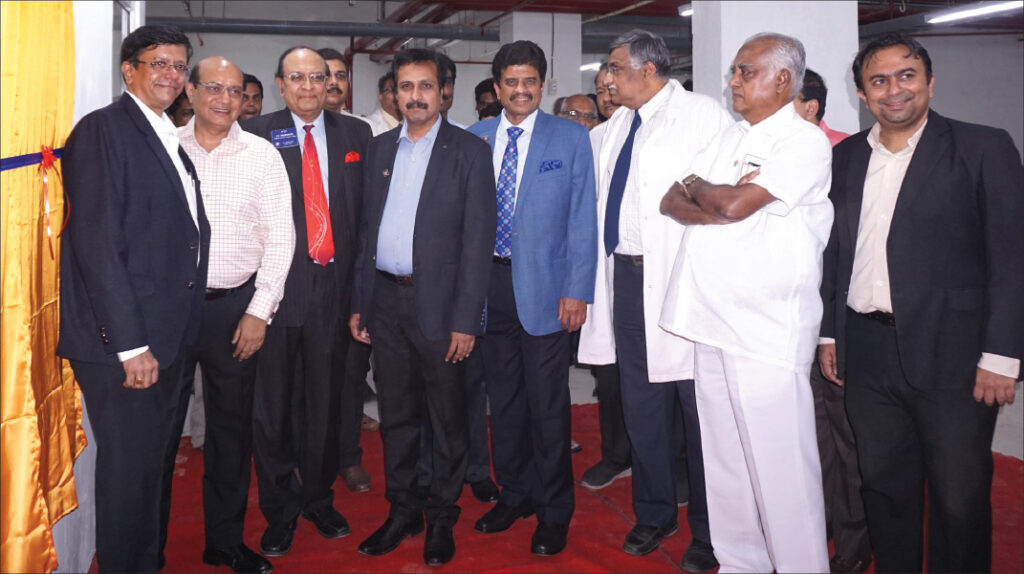We are familiar with eye bank and a blood bank. But a bone bank is fairly new to most of us. Tamil Nadu gets its first sophisticated bone bank, thanks to RC Madras Central, RID 3232, who have recently inaugurated the facility at the Adyar Cancer Institute in Chennai. It is the third such facility in India, the other two being at the Tata Cancer Institute, Mumbai, and M S Ramaiah Medical College in Bengaluru, where bones of living donors are preserved.

“We could potentially be the first bone bank to harvest bones from brain-dead donors. This will help in increasing the quantity and quality of bones available,” said Orthopaedic Oncologist Dr K Chandrakumar, who will head the bone bank.
The facility will preserve bones harvested from brain-dead patients to use them for treating patients affected by bone cancer or accident victims whose bones have been damaged.
RID Kamal Sanghvi who inaugurated the facility recently lauded the club for “the much-needed service” and added that he would “very much like to have it replicated in all other parts of the country. It is indeed a wonderful gift and a huge boon for cancer patients.”
The bone bank, named Rotary Madras Central Prahlad Rai Saraogi Bone Bank, was made possible with the support of global grant involving Rotary Clubs of Cataraqui Kingston, Nipigon, Kampala North, Sunrise Kampala and TRF.
Talking about the genesis of the project, Vinod Saraogi said that the idea was conceived in 2016 when the then president Dr Manoj Rajan and S R Balakrishnan had a discussion with Dr V Shanta, the Chairperson of the Adyar Cancer Hospital. With the cost of equipment working out to $100,000 Saraogi came forward to contribute a Term Gift of $30,000 from his family trust, while the then DG Natarajan Nagoji offered a sum from the DDF and the matching amount came from the international partners and TRF. The hospital provided space for the bone bank and treatment will be extended free for needy patients. Dr Chandrakumar has undergone training in Singapore and S Korea to handle operations of the bone bank, said Saraogi.
It will be a good idea to replicate the bone bank concept in all other parts of the country. It is indeed a wonderful gift and a huge boon for cancer patients.
-Kamal Sanghvi, RI Director
The process
Just as in organ donation, bones of brain-dead persons are harvested and refrigerated after sterilisation using gamma irradiation. The treated bones are called allograft bones. These bones are used to substitute cancer or tumour-affected bones as a natural and permanent solution. Presently such patients are treated with metal prosthesis after the affected bone is cut. The entire process would cost a minimum Rs 1.5 lakh and the process has to be repeated after about 15 years. But the allograft bone fitment is a permanent solution and is five times less expensive, said Saraogi.
These bones are used in spine, hip and knee surgeries and to treat malignant, benign and maxillofacial lesions too. The Cancer Institute has applied for licence with the Directorate of Medical and Rural Health Services, Government of Tamil Nadu, to harvest bones from brain-dead donors in the facility, and has signed an MoU with the Indira Gandhi Centre for Atomic Research in Kalpakkam for sterilisation. The bones will have a shelf life of three to five years depending on whether they are freeze-dried or deep frozen. The bone bank will benefit at least 40 to 50 patients every year at the Cancer Institute, said Saraogi.
PRID P T Prabhakar, IPDG Babu Peram, then Club President R Saranyan, past governors and the club members were present at the event. Hemanth Raj, Vice-chairman, Cancer Institute said that he was very happy and thanked Rotary for installing the facility. “It is a milestone indeed. Now we are better equipped to treat our patients effectively,” he said, adding that the bone transplant will be provided free for the needy.
The Rotary project enjoyed wide media coverage, thanks to the efforts of the district’s Public Image Associate Chairman Sreehari Abhilash, a member of RC United Chennai.






